This week’s bible story
The Unforgiving Servant: Matthew 18: 21-35
Have you ever broken anything? It could be a toy or a plate from the kitchen or even a bone in your body. Some things that are broken cannot be mended, but it is often possible to mend things that we have broken. If we care for our environment, it is a very good idea to try to mend things rather than always throwing them away and then buying new things. For example, what might use to mend the following things if they were broken: a hole in the toe of my socks? a ripped page in a book? a handle that has come off a mug? a puncture in my bike tyre? a cut finger?
What could you do about mending a broken friendship?
When you fall out with one of your friends, you can’t mend that friendship with a needle and thread, or some sellotape, or superglue or a puncture kit or a sticking plaster. Read the story about the Unforgiving Servant.
Jesus explained to his friend Peter that God is like the king in the story: Christians believe God forgives us every time we tell him we are sorry for the wrong things we have done, and he wants us to treat our friends in a similar way – forgiving them each time they say ‘sorry’ to us.
Reflection:
What would you say was the key word in that story? The key word could be ‘forgiveness’.
Have a think about these questions:
‘What does it mean to forgive someone?’ (KS2) or ‘What kind of things do you need to say sorry for? (KS1).
At the end of the Bible story Jesus tells us that, if we have done something wrong, we need to say sorry to God and then he will forgive us. In a similar way, if you have fallen out with a friend, two things often need to happen: if you know you have done something wrong or upset someone, you need to be brave enough to say sorry to that person. The person to whom you have said sorry then needs to forgive you.
So, going back to the questions at the beginning of the assembly:
What might I use to mend a broken friendship? A good answer to this question would be ‘forgiveness’.
Prayer
Dear Lord,
Thank you for today’s Bible story about forgiveness.
Thank you that if we say sorry to you, you give us a fresh start.
Please help us to be forgiving people here in this school.
Amen.
Week beginning 07 March 2022
Sorry you can’t be in school this week. Here are a range of resources linked to what is happening in class. Don’t forget to get in touch with your class teacher if you need support.
Maths
Follow this sequence of maths learning which is linked to algebra.
Lesson 1: video, worksheet, answers
Lesson 2: video, worksheet, answers
Lesson 3: video, worksheet, answers
Lesson 4: video, worksheet, answers
Lesson 5: video, worksheet, answers
Lesson 6: video, worksheet, answers
Lesson 7: video, worksheet, answers
Lesson 8: video, worksheet, answers
Lesson 9: video, worksheet, answers
Lesson 10: video, worksheet, answers
You don’t have to print the worksheet. Your child can write or draw their answers on paper. Your child’s learning will be most effective if you sit with them to pause the clip and check / praise / support your child as the clip moves on.
Practise times tables on Times Table Rockstars, too. Email the class teacher if you need your child’s login and password details.
(Suggested time: 30 minutes of Maths and 15 minutes of Rockstars daily)
Spelling
Look on the homework page to find this week’s spellings. They should choose some past spellings that they feel less confident with. Your child should complete one task each day.
- Day 1: Generate more words linked to the spelling pattern or ‘rule’. You could look out for the words in the book you’re reading at home, or any other text, like a website linked to our science topic of Living Things and their Habitat.
- Day 2: Practise the spellings using two of the ideas in our Super Spelling Strategies guide. (Set yourself and others at home a challenge of using some of the words when you’re speaking, too!)
- Day 3: Write separate sentences, each containing one of the spellings. (Don’t forget to show off really neat handwriting and make sure you sentence starts with a capital letter and ends with a full stop, exclamation mark (!) or question mark (?).
- Day 4: Repeat Task 2 or 3.
- Day 5: Get an adult at home to test you on your spellings. Practise any you spell incorrectly – you could write them out carefully until you’re sure.
(Suggested time: 15-20 minutes daily)
Reading fluency.
This is the text we’re using in school. It’s some top tips to stay safe online.
In school, we generally follow this sequence:
- Day 1: Read the text aloud with your child listening. Read it clearly and slowly, pointing to each word as you read. Have a chat about any unfamiliar words.
- Day 2: Read aloud each sentence (a full short sentence or part of a longer sentence), and have your child read it back to you. Do this ‘echo reading’ for the whole text.
- Day 3: Read the text and talk about the effect of the punctuation on how you read it – pauses for full stops and expression for exclamations (!) or questions (?). Your child reads the text aloud.
- Day 4: Read together with expression (just like you practised on Day 3).
- Day 5: Your child reads independently and fluently.
(Suggested time: 15 minutes daily)
Reading comprehension
We’ll be using this RIC text in class to practise comprehension skills. RIC stands for:
- Retrieve: finding information in a text
- Interpret: using clues in the text to unlock information
- Choice: thinking about the author’s choice of words, techniques or organisation that make the text interesting and enjoyable to read
This half term we’ll be reading a range of fiction and non-fiction texts about computing and online safety. Here’s a series of lessons based on A Career in Computer Games by Anthony Horowitz. There’s a whole series of lessons, but start at Lesson 1 and work through, doing one (or maybe even two) each day. If you’re self-isolating in your second week, try these poetry lessons on The British by Benjamin Zephaniah (Suggested time: 30 minutes daily)
Writing
In writing, be learning how to write a set of instructions for a computer game. Follow these lessons on instructional writing. There’s a whole series of lessons, but start at Lesson 1 and work through, doing one (or maybe even two) each day. (If you’re self-isolating in your second week, stick with the series of lessons you’ve already started and aim to complete the full series.)
(Suggested time: 30-40 minutes for each)
Topic
Our topic this half-term is computing.
Follow these lessons on selection in quizzes from Oak Academy. Follow the lesson sequence. It has 6 lessons so you could do three a week.
(Suggested time: 30-40 minutes)
Science
Last half term our topic was evolution.
These six lessons from Oak National Academy link closely to what we’ve been doing in class last half term. Start at Lesson 1 and work through, doing two or three in the week. If you’ve previously completed one of these lessons, have a go at the ones you haven’t completed yet.
If Science really motivates your child, you could also use look at these lessons all about practical Science.
(Suggested time: 30-45 minutes)
PE
Don’t forget to do some daily exercise!
Do two or three of these Five Minute Moves from Joe Wicks each day – spread them across the day as if they were playtimes, maybe!
Try working through this series of 25 lessons from the Association for Physical Education – do two or three in the week.
(Suggested time: 5 minutes daily, plus 30 minutes for the longer PE lessons)
Extra stuff…
As an extra (or as an alternative, if this helps to motivate your child)…
Geography isn’t a topic-driver this half-term, but you could brush up on your locational knowledge – something that was missed when schools closed earlier this year. You could explore some online maps and try to memorise some new countries, capitals, rivers and mountain ranges. These three lessons about Europe are worth checking out.
What about some Living and Learning? While you’re away from school, you could check out these lessons on money!
Week beginning 07 March 2022
Sorry you can’t be in school this week. Here are a range of resources linked to what is happening in class. Don’t forget to get in touch with your class teacher if you need support.
Maths
Follow this sequence of maths learning which is linked to fractions.
Lesson 1: video, worksheet, answers
Lesson 2: video, worksheet, answers
Lesson 3: video, worksheet, answers
Lesson 4: video, worksheet, answers
Lesson 5: video, worksheet, answers
Lesson 6: video, worksheet, answers
Lesson 7: video, worksheet, answers
Lesson 8: video, worksheet, answers
Lesson 9: video, worksheet, answers
Lesson 10: video, worksheet, answers
You don’t have to print the worksheet. Your child can write or draw their answers on paper. Your child’s learning will be most effective if you sit with them to pause the clip and check / praise / support your child as the clip moves on.
Practise times tables on Times Table Rockstars, too. Email the class teacher if you need your child’s login and password details.
(Suggested time: 30 minutes of Maths and 15 minutes of Rockstars daily)
Spelling
Look on the homework page to find this week’s spellings. They should choose some past spellings that they feel less confident with. Your child should complete one task each day.
- Day 1: Generate more words linked to the spelling pattern or ‘rule’. You could look out for the words in the book you’re reading at home, or any other text, like a website linked to our science topic of Living Things and their Habitat.
- Day 2: Practise the spellings using two of the ideas in our Super Spelling Strategies guide. (Set yourself and others at home a challenge of using some of the words when you’re speaking, too!)
- Day 3: Write separate sentences, each containing one of the spellings. (Don’t forget to show off really neat handwriting and make sure you sentence starts with a capital letter and ends with a full stop, exclamation mark (!) or question mark (?).
- Day 4: Repeat Task 2 or 3.
- Day 5: Get an adult at home to test you on your spellings. Practise any you spell incorrectly – you could write them out carefully until you’re sure.
(Suggested time: 15-20 minutes daily)
Reading fluency.
This is the text we’re using in school. It’s some top tips to stay safe online.
In school, we generally follow this sequence:
- Day 1: Read the text aloud with your child listening. Read it clearly and slowly, pointing to each word as you read. Have a chat about any unfamiliar words.
- Day 2: Read aloud each sentence (a full short sentence or part of a longer sentence), and have your child read it back to you. Do this ‘echo reading’ for the whole text.
- Day 3: Read the text and talk about the effect of the punctuation on how you read it – pauses for full stops and expression for exclamations (!) or questions (?). Your child reads the text aloud.
- Day 4: Read together with expression (just like you practised on Day 3).
- Day 5: Your child reads independently and fluently.
(Suggested time: 15 minutes daily)
Reading comprehension
We’ll be using this RIC text in class to practise comprehension skills. RIC stands for:
- Retrieve: finding information in a text
- Interpret: using clues in the text to unlock information
- Choice: thinking about the author’s choice of words, techniques or organisation that make the text interesting and enjoyable to read
This half term we’ll be reading a range of fiction and non-fiction texts about computing and online safety. Here’s a series of lessons based on A Career in Computer Games by Anthony Horowitz. There’s a whole series of lessons, but start at Lesson 1 and work through, doing one (or maybe even two) each day. If you’re self-isolating in your second week, try these poetry lessons on The British by Benjamin Zephaniah (Suggested time: 30 minutes daily)
Writing
In writing, be learning how to write a set of instructions for a computer game. Follow these lessons on instructional writing. There’s a whole series of lessons, but start at Lesson 1 and work through, doing one (or maybe even two) each day. (If you’re self-isolating in your second week, stick with the series of lessons you’ve already started and aim to complete the full series.)
(Suggested time: 30-40 minutes for each)
Topic
Our topic this half-term is computing.
Follow these lessons on selection in quizzes from Oak Academy. Follow the lesson sequence. It has 6 lessons so you could do three a week.
(Suggested time: 30-40 minutes)
Science
Last half term our topic was evolution.
These six lessons from Oak National Academy link closely to what we’ve been doing in class last half term. Start at Lesson 1 and work through, doing two or three in the week. If you’ve previously completed one of these lessons, have a go at the ones you haven’t completed yet.
If Science really motivates your child, you could also use look at these lessons all about practical Science.
(Suggested time: 30-45 minutes)
PE
Don’t forget to do some daily exercise!
Do two or three of these Five Minute Moves from Joe Wicks each day – spread them across the day as if they were playtimes, maybe!
Try working through this series of 25 lessons from the Association for Physical Education – do two or three in the week.
(Suggested time: 5 minutes daily, plus 30 minutes for the longer PE lessons)
Extra stuff…
As an extra (or as an alternative, if this helps to motivate your child)…
Geography isn’t a topic-driver this half-term, but you could brush up on your locational knowledge – something that was missed when schools closed earlier this year. You could explore some online maps and try to memorise some new countries, capitals, rivers and mountain ranges. These three lessons about Europe are worth checking out.
What about some Living and Learning? While you’re away from school, you could check out these lessons on money!
Week beginning 07 March 2022
Hi everyone
We hope you’re feeling happy and healthy at home. We miss having you in school but we want you to know that you’re still very much part of our school community. Enjoy your home learning for this week.
Maths
Follow this sequence of maths learning which is linked to fractions.
- Lesson 1: video, worksheet, answers
- Lesson 2: video, worksheet, answers
- Lesson 3: video, worksheet, answers
- Lesson 4: video, worksheet, answers
- Lesson 5: video, worksheet, answers
- Lesson 6: video, worksheet, answers
- Lesson 7: video, worksheet, answers
- Lesson 8: video, worksheet, answers
- Lesson 9: video, worksheet, answers
- Lesson 10: video, worksheet, answers
You don’t have to print the worksheet. Your child can write or draw their answers on paper. Your child’s learning will be most effective if you sit with them to pause the clip and check / praise / support your child as the clip moves on.
Practise times tables on Times Table Rockstars, too. If your child is in Y3, we’re concentrating on the 8 times table. If your child is in Y4, we’re concentrating on all times tables up to and including 12 x 12. Email the class teacher if you need your child’s login and password details.
(Suggested time: 30 minutes of Maths and 15 minutes of Rockstars daily)
Spelling
Look on the homework page to find this week’s spellings. They should choose some past spellings that they feel less confident with. Your child should complete one task each day.
- Day 1: Generate more words linked to the spelling pattern or ‘rule’. You could look out for the words in the book you’re reading at home, or any other text, like a website linked to our science topic of Living Things and their Habitat.
- Day 2: Practise the spellings using two of the ideas in our Super Spelling Strategies guide. (Set yourself and others at home a challenge of using some of the words when you’re speaking, too!)
- Day 3: Write separate sentences, each containing one of the spellings. (Don’t forget to show off really neat handwriting and make sure you sentence starts with a capital letter and ends with a full stop, exclamation mark (!) or question mark (?).
- Day 4: Repeat Task 2 or 3.
- Day 5: Get an adult at home to test you on your spellings. Practise any you spell incorrectly – you could write them out carefully until you’re sure.
(Suggested time: 15-20 minutes daily)
Reading fluency
This is the text we’re using in class this week to build up fluency skills.
In school, we generally follow this sequence:
- Day 1: Read the text aloud with your child listening. Read it clearly and slowly, pointing to each word as you read. Have a chat about any unfamiliar words.
- Day 2: Read aloud each sentence (a full short sentence or part of a longer sentence), and have your child read it back to you. Do this ‘echo reading’ for the whole text.
- Day 3: Read the text and talk about the effect of the punctuation on how you read it – pauses for full stops and expression for exclamations (!) or questions (?). Your child reads the text aloud.
- Day 4: Read together with expression (just like you practised on Day 3).
- Day 5: Your child reads independently and fluently.
(Suggested time: 15 minutes daily)
Reading comprehension
We’ll be using this RIC text in class to practise comprehension skills. RIC stands for:
- Retrieve: finding information in a text
- Interpret: using clues in the text to unlock information
- Choice: thinking about the author’s choice of words, techniques or organisation that make the text interesting and enjoyable to read
Follow these lessons from Oak National Academy. There’s a whole series of lessons, but start at Lesson 1 and work through, doing one (or maybe even two) each day. (If you’re self-isolating in your second week, stick with the series of lessons you’ve already started and aim to complete the full series.)
(Suggested time: 30 minutes daily)
Writing
Follow these lessons from Oak National Academy. There’s a whole series of lessons, but start at Lesson 1 and work through, doing one (or maybe even two) each day. (If you’re self-isolating in your second week, stick with the series of lessons you’ve already started and aim to complete the full series.)
(Suggested time: 30-40 minutes for each)
Topic
Our topic this half-term is about computing.
Follow these lessons from Oak National Academy. There’s a whole series of lessons, but start at Lesson 1 and work through, doing one (or maybe even two) each day. (If you’re self-isolating in your second week, stick with the series of lessons you’ve already started and aim to complete the full series.)
(Suggested time: 30-40 minutes)
Science
Our focus this half-term is about working scientifically.
These six lessons from Oak National Academy link closely to what we’ve been doing in class. Start at Lesson 1 and work through, doing two or three in the week. If you’ve previously completed on of these lessons, have a go at the ones you haven’t completed yet.
If Science really motivates your child, you could also use look at these lessons all about practical Science.
(Suggested time: 30-45 minutes)
PE
Don’t forget to do some daily exercise!
Do two or three of these Five Minute Moves from Joe Wicks each day – spread them across the day as if they were playtimes, maybe!
Try working through this series of 25 lessons from the Association for Physical Education – do two or three in the week.
(Suggested time: 5 minutes daily, plus 30 minutes for the longer PE lessons)
Extra stuff…
As an extra (or as an alternative, if this helps to motivate your child)…
Fancy learning about a new religion? You don’t have to be religious to learn about, and appreciate, religions from all around the world. Check out this set of lessons from Oak National Academy – you could choose to focus on one religion or dip into each set for an overview.
What about some Living and Learning? While you’re away from school, you could check out these lessons on keeping safe!
Week beginning 07 March 2022
Hi everyone
We hope you’re feeling happy and healthy at home. We miss having you in school but we want you to know that you’re still very much part of our school community. Enjoy your home learning for this week.
Maths
Follow this sequence of maths learning which is linked to fractions.
- Lesson 1: video, worksheet, answers
- Lesson 2: video, worksheet, answers
- Lesson 3: video, worksheet, answers
- Lesson 4: video, worksheet, answers
- Lesson 5: video, worksheet, answers
- Lesson 6: video, worksheet, answers
- Lesson 7: video, worksheet, answers
- Lesson 8: video, worksheet, answers
- Lesson 9: video, worksheet, answers
- Lesson 10: video, worksheet, answers
You don’t have to print the worksheet. Your child can write or draw their answers on paper. Your child’s learning will be most effective if you sit with them to pause the clip and check / praise / support your child as the clip moves on.
Practise times tables on Times Table Rockstars, too. If your child is in Y3, we’re concentrating on the 8 times table. If your child is in Y4, we’re concentrating on all times tables up to and including 12 x 12. Email the class teacher if you need your child’s login and password details.
(Suggested time: 30 minutes of Maths and 15 minutes of Rockstars daily)
Spelling
Look on the homework page to find this week’s spellings. They should choose some past spellings that they feel less confident with. Your child should complete one task each day.
- Day 1: Generate more words linked to the spelling pattern or ‘rule’. You could look out for the words in the book you’re reading at home, or any other text, like a website linked to our science topic of Living Things and their Habitat.
- Day 2: Practise the spellings using two of the ideas in our Super Spelling Strategies guide. (Set yourself and others at home a challenge of using some of the words when you’re speaking, too!)
- Day 3: Write separate sentences, each containing one of the spellings. (Don’t forget to show off really neat handwriting and make sure you sentence starts with a capital letter and ends with a full stop, exclamation mark (!) or question mark (?).
- Day 4: Repeat Task 2 or 3.
- Day 5: Get an adult at home to test you on your spellings. Practise any you spell incorrectly – you could write them out carefully until you’re sure.
(Suggested time: 15-20 minutes daily)
Reading fluency
This is the text we’re using in class this week to build up fluency skills.
In school, we generally follow this sequence:
- Day 1: Read the text aloud with your child listening. Read it clearly and slowly, pointing to each word as you read. Have a chat about any unfamiliar words.
- Day 2: Read aloud each sentence (a full short sentence or part of a longer sentence), and have your child read it back to you. Do this ‘echo reading’ for the whole text.
- Day 3: Read the text and talk about the effect of the punctuation on how you read it – pauses for full stops and expression for exclamations (!) or questions (?). Your child reads the text aloud.
- Day 4: Read together with expression (just like you practised on Day 3).
- Day 5: Your child reads independently and fluently.
(Suggested time: 15 minutes daily)
Reading comprehension
We’ll be using this RIC text in class to practise comprehension skills. RIC stands for:
- Retrieve: finding information in a text
- Interpret: using clues in the text to unlock information
- Choice: thinking about the author’s choice of words, techniques or organisation that make the text interesting and enjoyable to read
Follow these lessons from Oak National Academy. There’s a whole series of lessons, but start at Lesson 1 and work through, doing one (or maybe even two) each day. (If you’re self-isolating in your second week, stick with the series of lessons you’ve already started and aim to complete the full series.)
(Suggested time: 30 minutes daily)
Writing
Follow these lessons from Oak National Academy. There’s a whole series of lessons, but start at Lesson 1 and work through, doing one (or maybe even two) each day. (If you’re self-isolating in your second week, stick with the series of lessons you’ve already started and aim to complete the full series.)
(Suggested time: 30-40 minutes for each)
Topic
Our topic this half-term is about computing.
Follow these lessons from Oak National Academy. There’s a whole series of lessons, but start at Lesson 1 and work through, doing one (or maybe even two) each day. (If you’re self-isolating in your second week, stick with the series of lessons you’ve already started and aim to complete the full series.)
(Suggested time: 30-40 minutes)
Science
Our focus this half-term is about working scientifically.
These six lessons from Oak National Academy link closely to what we’ve been doing in class. Start at Lesson 1 and work through, doing two or three in the week. If you’ve previously completed on of these lessons, have a go at the ones you haven’t completed yet.
If Science really motivates your child, you could also use look at these lessons all about practical Science.
(Suggested time: 30-45 minutes)
PE
Don’t forget to do some daily exercise!
Do two or three of these Five Minute Moves from Joe Wicks each day – spread them across the day as if they were playtimes, maybe!
Try working through this series of 25 lessons from the Association for Physical Education – do two or three in the week.
(Suggested time: 5 minutes daily, plus 30 minutes for the longer PE lessons)
Extra stuff…
As an extra (or as an alternative, if this helps to motivate your child)…
Fancy learning about a new religion? You don’t have to be religious to learn about, and appreciate, religions from all around the world. Check out this set of lessons from Oak National Academy – you could choose to focus on one religion or dip into each set for an overview.
What about some Living and Learning? While you’re away from school, you could check out these lessons on keeping safe!
04 March 2022
Please find this week’s spellings below:
- library
- building
- century
- circle
- experiment
- February
- group
- question
Ask your child why February has a capital letter!
These will be tested on Friday 11th March.
Good luck!
Pancakes and book characters
This week has been very busy at nursery as we have celebrated two important events: Shrove Tuesday and World Book Day. We began by talking about Shrove Tuesday and why it is important in the Christian calendar, and we also read ‘Mr Wolf’s Pancakes’ to inspire our learning. The children made their own pretend pancakes and took part in some pancake-inspired activities. Whilst decorating some real pancakes, we discussed our favourite toppings and thought about the healthy choices we could make. On Thursday, lots of children (and staff) dressed up to celebrate World Book Day. The children really enjoyed creating their own books and reading their stories to the rest of the class.
We have started to look closely at the number three and will continue to explore it next week. Perhaps you could ask your child if they can spot the number three in the environment (registration plates, buses and house numbers are good places to start looking for numerals). As Spring is on its way, we will also be looking at ‘growing’ over the next couple of weeks and will be planting our own beans and seeds.
















This week’s message (Friday 04 March 2022)
We’re now over half-way through the school year. If you managed one, we hope you had a good break over the half-term period. This week’s message contains an attendance update and a reminder about two things that were communicated earlier in the week.
Attendance matters
The overall whole-school attendance figure up to the end of Spring 1 is 94.2%. That’s the same as we were at the end of the Autumn term, despite Covid – great news!
- Reception: 93.8% – a slight increase since December – well done!
- Year 1: 95.3% – another increase – brilliant!
- Year 2: 95.9%
- Year 3: 91.6%
- Year 4: 92.2% – this attendance has increased a little, too – thank you!
- Year 5: 95.5%
- Year 6: 96.1% – and another year group where attendance has risen – fantastic!
Russia-Ukraine war
On Monday evening, we sent an email to let you know we’d be speaking with children about the current crisis. Children in Key Stage 2 had an assembly about this. Children in Key Stage 1 had a shorter discussion in class. We had no plans to speak with children in Foundation Stage unless a child raised it, in which case we’d respond in a very ‘light’ way.
Children coped well. They seemed to appreciate being told some basic facts and being provided with some reassurance. In case you missed it, we provided some website links so that you can support your child more:
- Supporting your child if they see upsetting content online about what is happening in Ukraine (Childnet)
- How to talk to children about what’s happening in Ukraine and World War Three anxiety (Metro)
- How and when to talk to children about war, according to a parenting expert (Independent)
- How to cope with traumatic news – an illustrated guide (ABC News, Australia)
- Talking with Children About War and Violence in the World (Family Education, US)
- Tips for parents and caregivers on media coverage of traumatic events (The National Child Traumatic Stress Network, US)
Covid caution continues
You’ll know that the government issued new advice about self-isolation and testing. This letter from Leeds Children and Families Team sets out what the new guidance is. If you’ve not already done so, do take a minute or so to read it.
Next week’s message comes from Mr Wilks, who leads on Science and Topic subjects – it’s about our current Computing topic.
Spring is coming!
This half-term’s topic is called ‘Let’s go!’ They will notice and observe the signs and changes of Spring. This week, our focus story is The Hundred Decker Bus by Mike Smith. The children drew their favourite deck and labelled the different parts. Next week, the children will design their own deck. We will also compare life in a city to life in the countryside.
FH – A city is very busy with lots of big buildings like skyscrapers.
BI – Lots of animals live in the countryside.
Over the next few weeks, we will be planting a variety of fruit and vegetable seeds. We will watch them grow and will learn what conditions are needed for them to grow.
Phonics
The children have learnt all of the phase 3 sounds. Over the next couple of weeks, they will learn to blend (read) and segment (spell) longer words for example, lemon, sunset, bedroom and farmyard. To help them read words with more than one syllable, they will be taught how to use the chunking method. For example, sunset = s-u-n /s-e-t. This method also helps when they are writing longer words.
Maths
This week, we continued to engage with activities that focussed on the purpose of counting – to find out ‘how many’ objects there are. We revisited the concept of cardinality – the idea that the last number in the count tells us how many things there are altogether. We also looked at the 1 more staircase pattern. This pattern has helped them develop a clear understanding that each number has a value of 1 more than the previous number, and 1 less than the following number.
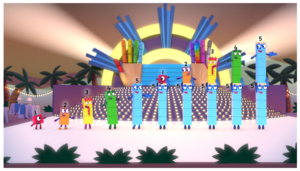 Have a look at what else we have been up to this week.
Have a look at what else we have been up to this week.
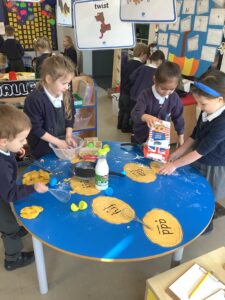
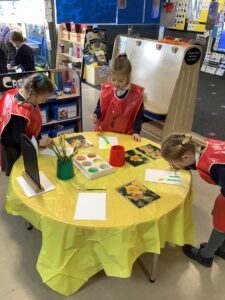
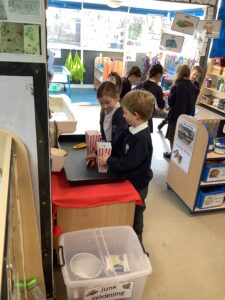
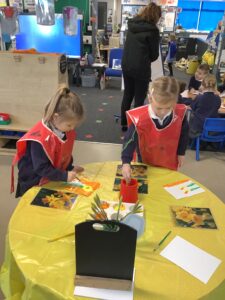
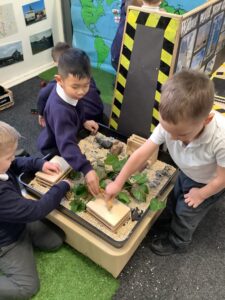
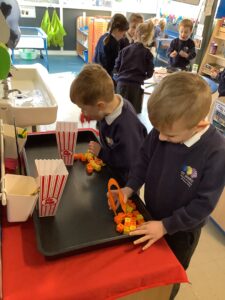
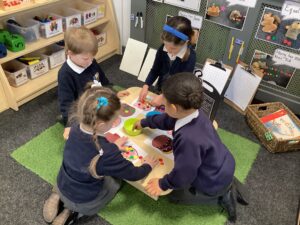
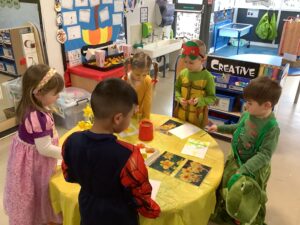
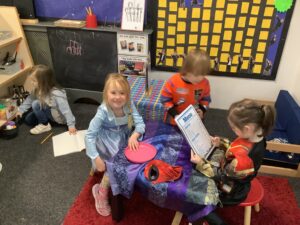
Outdoor fun!
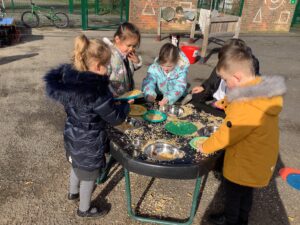
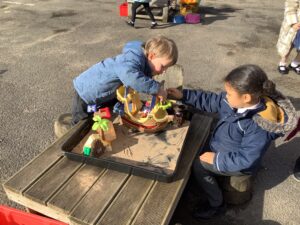
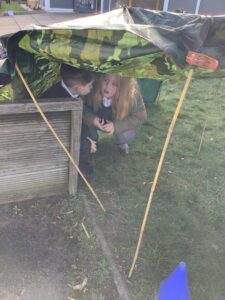
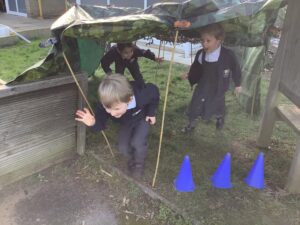
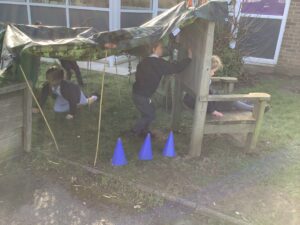
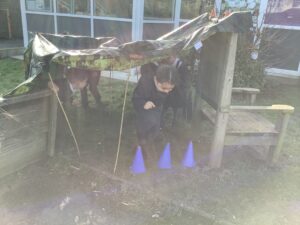
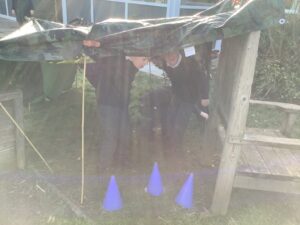
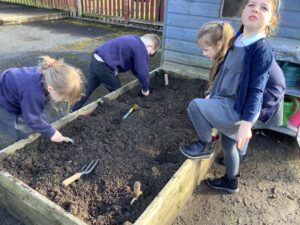 World Book Day
World Book Day
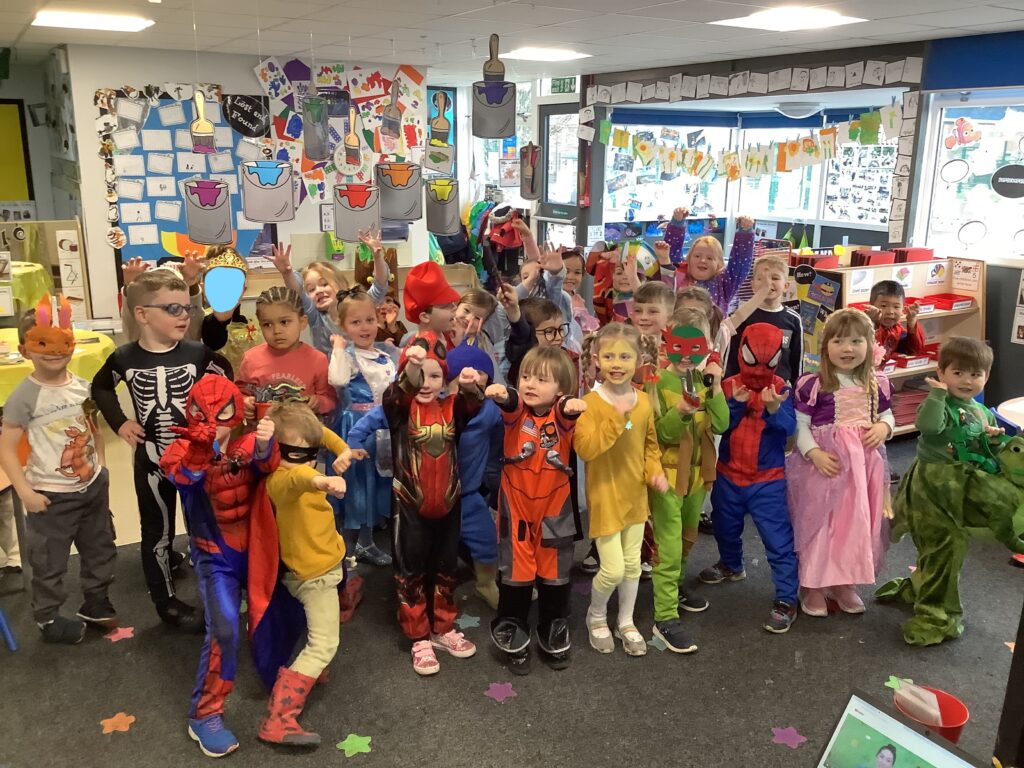 Home-Link Challenge
Home-Link Challenge
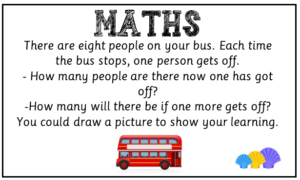
4 March 2022
Y1: there, their, they, to, do
This week, the Year 2 children have some contractions words for their spellings. We talked about how it is the process of shortening a word or a group of words. E.g. cannot becomes can’t.
Y2: children, Christmas, class, climb, can’t, didn’t, hasn’t, couldn’t, it’s, i’ll
